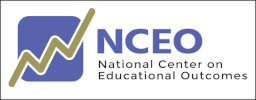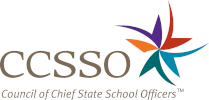School leaders play a key role in creating and sustaining schools that meet the needs of all learners, including students with disabilities. A whole-school approach, where there is shared responsibility for supporting the learning and success of all students, creates a positive collaborative organization that leads to better outcomes. This resource for school leaders focuses on the inclusion of students with disabilities, including English learners with disabilities and students with significant cognitive disabilities, in assessment, and the academic instruction that preceded it.
Students with disabilities are expected to gain the knowledge and skills needed to successfully participate in postsecondary education and careers by the time they exit high school. School leaders can guide the creation of a culture that helps move the whole school community toward supporting the learning of all students, including all students with disabilities.
Educator expectations influence student achievement. Federal legislation (Individuals with Disabilities Education Act–IDEA and the Every Student Succeeds Act–ESSA) requires that all students have access to rigorous academic content based on grade-level academic content standards. When students with disabilities, including English learners with disabilities and students with significant cognitive disabilities, have the opportunity to learn rigorous content, they often surprise us. High expectations for all students with disabilities foster the learning of grade-level academic content that leads to improved outcomes.
What can school leaders do to ensure all students with disabilities are instructed in the academic content for their enrolled grade?
Develop a shared vision with staff and families, including families of students with disabilities, that:
- supports the learning of all students at higher levels
- is inclusive of all students including students with disabilities and English learners with disabilities
- supports all members of the school community as they implement practices that support this vision
Provide ongoing professional development for all educators about:
- using grade-level content standards to guide instruction
- using practices that support the learning of all students such as Universal Design for Learning (UDL), multi-tiered system of supports (MTSS), and co-teaching models
- understanding the continuum of learning needs of students with disabilities and how to support those needs
- selecting and implementing accessibility supports and accommodations to enable meaningful access to grade-level content
Use state and local assessment data to inform professional development and instructional decision making.
Create an environment that supports collaboration among general, special education and English language teachers, and related service providers to teach and provide services in inclusive educational settings by:
- providing planning tools and data so teams can analyze, evaluate, and inform their instructional practices
- scheduling time for teams to plan
What can school leaders do to ensure all students with disabilities participate in state and district content assessments, and for English learners with disabilities also in English language proficiency assessments, for their enrolled grade?
Implement procedures to ensure that all students, including all students with disabilities and English learners with disabilities, participate in state and local assessments;
Provide professional development on the use of state and district participation guidelines and tools to make decisions about whether a student should take a general assessment with or without accommodations or an alternate assessment;
Ensure that educators and parents or guardians understand the implications of assessment participation decisions. For example, a decision for a third-grade student to participate in an alternate assessment may have implications for instruction that affect long-term outcomes such as whether the student will earn a regular high school diploma.
Talking Points for School Leaders
- Our school values all students and has high expectations for all, including students with disabilities and English learners with disabilities.
- All students in our school have the opportunity to learn grade-level academic content for their enrolled grade so they will gain the knowledge and skills to be successful throughout their school years, and later during post-secondary education and careers.
- Educators in our school collaboratively plan and implement instruction that meets the needs of all learners.
- Our school has a culture that values collaborating with parents or guardians and communities to support the learning of all students, including students with disabilities and English learners with disabilities.
School leaders should customize these talking points to meet their specific school contexts.
The information in this resource reflects the Professional Standards for Educational Leaders 2015 (Standards #1, 5, 10) and Promoting Principal Leadership for the Success of Students with Disabilities.
https://ccsso.org/sites/default/files/2017-10/PSELforSWDs01252017_0.pdf
CCSSO’s Assessment, Standards, and Education for Students with Disabilities (ASES) and School Leadership Development and Supports (SLDS) state collaboratives made important contributions to this document.
Hinkle, A. R., Lazarus, S. S., Hall, S., Warren, S., Thurlow, M. L., & Liu, K. K. (2021). Supporting the inclusion of students with disabilities in assessments (School Leaders Series #1). Council of Chief State School Officers (CCSSO) & National Center on Educational Outcomes (NCEO).
The Council of Chief State School Officers (CCSSO) is a nonpartisan, nationwide, nonprofit organization of public officials who head departments of elementary and secondary education in the states, the District of Columbia, the Department of Defense Education Activity, Bureau of Indian Education, and five U.S. extra-state jurisdictions. CCSSO provides leadership, advocacy, and technical assistance on major educational issues. The Council seeks member consensus on major educational issues and expresses their views to civic and professional organizations, federal agencies, Congress, and the public.
The National Center on Educational Outcomes (NCEO) is supported through a Cooperative Agreement (#H326G160001) with the Research to Practice Division, Office of Special Education Programs, U.S. Department of Education. The Center is affiliated with the Institute on Community Integration at the College of Education and Human Development, University of Minnesota. The contents of this report were partially developed under the Cooperative Agreement from the U.S. Department of Education, but does not necessarily represent the policy or opinions of the U.S. Department of Education or Offices within it. Readers should not assume endorsement by the federal government. Project Officer: David Egnor


